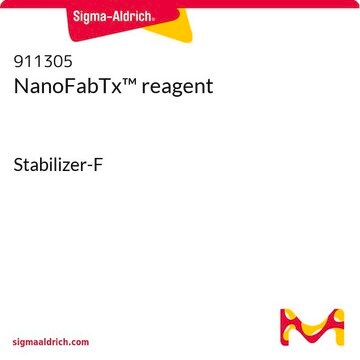913375
Branched polyethylenimine solution
2mg/mL aqueous solution, suitable for biomedical research
Synonym(s):
PEI solution
Sign Into View Organizational & Contract Pricing
All Photos(1)
About This Item
Recommended Products
Quality Level
form
liquid
concentration
2 mg/mL
color
colorless to pale yellow
storage temp.
2-8°C
InChI
1S/C2H5N/c1-2-3-1/h3H,1-2H2
InChI key
NOWKCMXCCJGMRR-UHFFFAOYSA-N
Related Categories
Application
High molecular weight branched PEI is commonly used in gene delivery due to its high transfection efficiency in a broad range of cells. Branched PEI has been used to successfully deliver genetic material both in vitro and in vivo, while maintaining low cytotoxicity with DNA complexation.
Storage Class Code
12 - Non Combustible Liquids
WGK
WGK 1
Choose from one of the most recent versions:
Certificates of Analysis (COA)
Lot/Batch Number
Don't see the Right Version?
If you require a particular version, you can look up a specific certificate by the Lot or Batch number.
Already Own This Product?
Find documentation for the products that you have recently purchased in the Document Library.
W T Godbey et al.
Journal of biomedical materials research, 45(3), 268-275 (1999-07-09)
Poly(ethylenimine) (PEI) samples of various molecular weights and pHs were used to transfect endothelial cells to achieve levels of gene expression for comparison. PEIs with nominal molecular weights of 600, 1200, 1800, 10,000, and 70,000 Da were examined at pHs
O Boussif et al.
Proceedings of the National Academy of Sciences of the United States of America, 92(16), 7297-7301 (1995-08-01)
Several polycations possessing substantial buffering capacity below physiological pH, such as lipopolyamines and polyamidoamine polymers, are efficient transfection agents per se--i.e., without the addition of cell targeting or membrane-disruption agents. This observation led us to test the cationic polymer polyethylenimine
Articles
CRISPR/Cas9 delivery via nonviral nanoparticles shows promising advancements for gene editing in disease treatment.
Our team of scientists has experience in all areas of research including Life Science, Material Science, Chemical Synthesis, Chromatography, Analytical and many others.
Contact Technical Service





